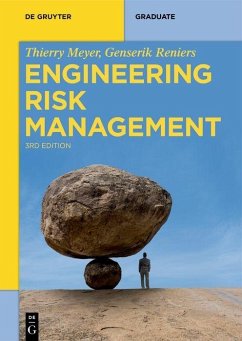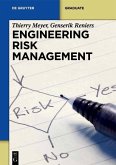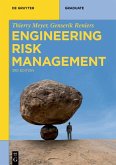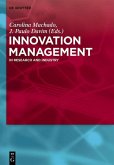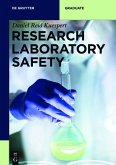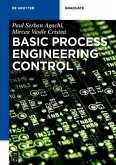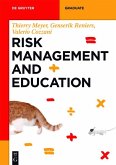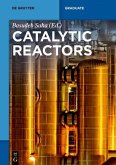This revised and updated 3rd edition of Engineering Risk Management presents management principles, risk diagnostics, analysis and treatment methods, followed by examples of practical implementation in chemistry, physics, and nanotechnology. An all-new chapter on dynamic risk assessment makes this a uniquely up-to-date and comprehensive treatise on engineering risk management theory and strategies.
Prof. Dr. Thierry Meyer received a diploma degree (MSc) in chemical engineering from the Swiss Federal Institute of Technology in Lausanne (EPFL) in 1986. He was awarded in 1989 a PhD at EPFL for his thesis on micromixing in highly viscous polymeric media. From 1989 until 1993, he worked in the Chemical Engineering Institute as senior scientist in the field of polymerization reactions. In 1994, he joined Ciba-Geigy SA in the pigment division as successively development chemist, head of development a.i. and finally production manager for high performance pigments. At the end of 1998, he returned to the Chemical Engineering Institute of the EPFL in Lausanne and was appointed 'maître d'enseignement et de recherche' (MER) to lead a new research group in the field of polymers and supercritical fluids, and to teach in the fields of process development, introduction to chemical engineering, polymer and organic chemistry at bachelor and master levels to chemists, chemical engineers and material science students. In 2005, he took on the responsibility of the occupational health and safety service of the school of basic sciences on top of his research activities dealing with risk management and supercritical fluids. He is presently teaching introduction to chemical engineering at bachelor level, risk management at master level and specific courses on safety aspects in research activities. He is also active as adviser and expert in risk assessment and chemical engineering matters for the ICC (International Chamber of Commerce) of the World Business Organization, as well as for several assessment companies and for major and SME's chemical industries. Thierry Meyer is currently member of several international associations of the European Federation of Chemical Engineering and American Chemical Society. He was chairman of the European Working Party on Polymer Reaction Engineering from 2001 to 2006. He is member of several editorial boards: Chemical Engineering Research and Design, Macromolecular Reaction Engineering, Chemical Engineering and Technology.
Prof Dr. Genserik Reniers obtained a Master's degree in chemical engineering at the Vrije Universiteit Brussel and received his PhD in Applied Economic Sciences from the University of Antwerp. He lectures amongst others in chemistry, organic chemistry, chemical process technology, and Technological Risk Management at TU Delft and the University of Antwerp. He is also visiting professor of Security Management at the Antwerp Management School, Risk Management at ITMMA, and Risk Analysis in a Postgraduate Disaster Management at VESTA. At the Hogeschool-Universiteit Brussel in Brussels he lectures in prevention management, advanced occupational health and safety management and chemical processes/unit operations. His main research interests concern the collaboration surrounding safety and security topics and socio-economic optimization within the chemical industry. He coordinates the Antwerp Research Group on Safety and Security, unifying multi-disciplinary safety and security research at the University of Antwerp. He has extensive experience in leading research projects funded both by the Belgian government and the chemical industry.
Prof. Dr. Thierry Meyer received a diploma degree (MSc) in chemical engineering from the Swiss Federal Institute of Technology in Lausanne (EPFL) in 1986. He was awarded in 1989 a PhD at EPFL for his thesis on micromixing in highly viscous polymeric media. From 1989 until 1993, he worked in the Chemical Engineering Institute as senior scientist in the field of polymerization reactions. In 1994, he joined Ciba-Geigy SA in the pigment division as successively development chemist, head of development a.i. and finally production manager for high performance pigments. At the end of 1998, he returned to the Chemical Engineering Institute of the EPFL in Lausanne and was appointed 'maître d'enseignement et de recherche' (MER) to lead a new research group in the field of polymers and supercritical fluids, and to teach in the fields of process development, introduction to chemical engineering, polymer and organic chemistry at bachelor and master levels to chemists, chemical engineers and material science students. In 2005, he took on the responsibility of the occupational health and safety service of the school of basic sciences on top of his research activities dealing with risk management and supercritical fluids. He is presently teaching introduction to chemical engineering at bachelor level, risk management at master level and specific courses on safety aspects in research activities. He is also active as adviser and expert in risk assessment and chemical engineering matters for the ICC (International Chamber of Commerce) of the World Business Organization, as well as for several assessment companies and for major and SME's chemical industries. Thierry Meyer is currently member of several international associations of the European Federation of Chemical Engineering and American Chemical Society. He was chairman of the European Working Party on Polymer Reaction Engineering from 2001 to 2006. He is member of several editorial boards: Chemical Engineering Research and Design, Macromolecular Reaction Engineering, Chemical Engineering and Technology.
Prof Dr. Genserik Reniers obtained a Master's degree in chemical engineering at the Vrije Universiteit Brussel and received his PhD in Applied Economic Sciences from the University of Antwerp. He lectures amongst others in chemistry, organic chemistry, chemical process technology, and Technological Risk Management at TU Delft and the University of Antwerp. He is also visiting professor of Security Management at the Antwerp Management School, Risk Management at ITMMA, and Risk Analysis in a Postgraduate Disaster Management at VESTA. At the Hogeschool-Universiteit Brussel in Brussels he lectures in prevention management, advanced occupational health and safety management and chemical processes/unit operations. His main research interests concern the collaboration surrounding safety and security topics and socio-economic optimization within the chemical industry. He coordinates the Antwerp Research Group on Safety and Security, unifying multi-disciplinary safety and security research at the University of Antwerp. He has extensive experience in leading research projects funded both by the Belgian government and the chemical industry.
Dieser Download kann aus rechtlichen Gründen nur mit Rechnungsadresse in A, B, BG, CY, CZ, D, DK, EW, E, FIN, F, GR, HR, H, IRL, I, LT, L, LR, M, NL, PL, P, R, S, SLO, SK ausgeliefert werden.

